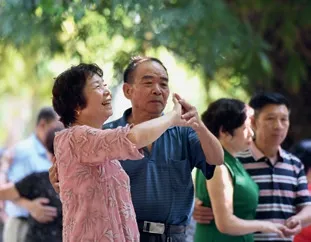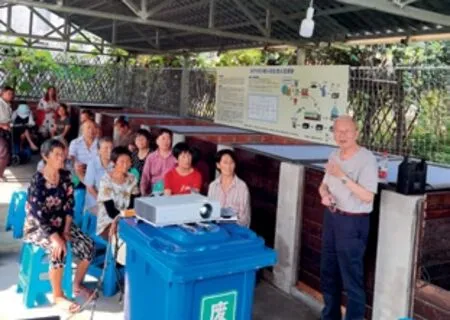Engaging With Aging
2022-10-24SeniorcitizensseekproductivewaystospendtheirfreetimeByLuYan
Senior citizens seek productive ways to spend their free time By Lu Yan
Since her retirement in 2016, Liu Qingjie has been enjoying the comforts of a leisurely life together with her husband in Changchun,Jilin Province. Given their son resides in another city, the couple doesn’t have to look after their grandchildren like so many retirees in China do.Their daily routine involves: a trip to the farmers’market, watching television, a quick browse through mobile short video platforms and exercising with their friends in the park at sundown.
“I thought it was the perfect life the first couple of years after I’d stopped working,” Liu said.“But now it’s getting a bit boring.” She’s looking for more interesting ways to keep busy. While working in the rail engineering industry, Liu had a keen interest in doing business and believed she would make a good salesperson. So today, she’s looking for a part-time position to realize this little but long-cherished dream.
Like Liu, a large number of retirees, no matter their age, are seeking employment in diverse ways. In addition to earning some extra pocket money, many deem it a new way of life in their golden years.
Retired but reactivated
China is a rapidly aging nation, with the number of people aged 60 and above exceeding 267 million, accounting for 18.9 percent of its population, by the end of last year. This proportion is expected to surpass 30 percent by 2035.
In three years, the country will become a moderately aging society with 20 percent of the population aged 60 and above, and a severely aging society by 2035 when 400 million people will be 60 or over, accounting for 30 percent of the population, Wang Haidong, Director of the NHC’s Department of Aging and Health, said at a press conference on September 20.
The pension eligibility age in China is 60 for men, 55 or 60 for female white-collar employees and 50 for female blue-collar workers. Average life expectancy is projected to reach 78.3 in 2025, according to a fiveyear plan for public services. A white paper released by the State Council Information Office read that the average life expectancy in China had previously gone from 67.8 in 1981 to 77.3 in 2019.
The country’s baby boom in the 1960s and early 1970s, with the number of births peaking in 1963, registered nearly 30 million newborns. Today,those people are approaching or have already entered retirement.
To meet the needs of those who are in good shape and don’t feel the need to resign themselves to a senior lifestyle of rest and relaxation, this August,the Senior Talent Information Center of the China National Committee on Aging created an online network publishing job openings specifically for older citizens looking for employment. Within two days of its launch, more than 5,000 job seekers and 100 enterprises had registered on the platform.
The network aims to broaden the channels of senior employment and establish a think tank that studies how to better serve and engage China’s aging population, Wang Jianjun, President of the China National Committee on Aging, told.

Retired residents dance in a park in Fuzhou, Fujian Province, on October 4
“I think people with much expertise and social experience have a high chance at reemployment after retirement,” a human resources employee surnamed Chen in Tianjin Municipality told local media outlet.Though still a few years away from retirement, Chen, in her 50s, has already begun planning for her golden age and seeking reemployment. “It’s not because of any financial pressure, but I don’t want to be at home doing nothing all day every day. I’m not old at all. I prefer finding something meaningful to do and keeping active and young,” Chen explained.
Based on her previous work experience, Chen plans to find a job in commercial pension insurance planning once she’s officially retired. “It’s not quite the same as what I do now, but it will motivate me to constantly learn new things. Despite some level of stress, I can use the skills and resources I have developed in the new field,” she said, adding many of her friends and acquaintances have similar plans.
A law on the protection of the rights and interests of the senior citizen enacted in 1996 stipulates the country should give play to their expertise and create the right conditions to guarantee the participation of older persons in economic, political, cultural and social life. Seniors are further encouraged to partake in business and production, and engage in public welfare undertakings.
One post of a McDonald’s in Beijing recruiting retired seniors as waiters went viral. The position offered a monthly salary of 1,800 to 3,500 yuan ($251 to $488) for four or five days a week, four to eight hours a day. This brought the topic of senior citizens getting reemployed into the public spotlight,sparking much debate regarding its feasibility.
“Flexible employment for seniors will contribute to social stability in the long term,” Lu Jiehua, deputy head of the China Population Association and a professor with the Department of Sociology at Peking University, told. He does, however, believe companies reemploying retired people might negatively affect the employment of younger generations, and the government should take measures to improve intergenerational fairness.But in the long run, encouraging senior employment will prove more helpful than harmful because it can help relieve pressures generated by an increasingly aging society in terms of pensions, health insurance and senior care resource scarcity.

A bioresearch expert (right) reemployed by the Chengdu Institute of Biology under the Chinese Academy of Sciences gives a presentation at a seminar on ecological protection in Chengdu, Sichuan Province, on August 28, 2020
All concerns considered
“We also need well-rounded legal and social security systems to address their concerns, protect their rights and ensure carefree reemployment,” Lu said,adding such protection covers the issues of work hours and work injury compensation insurance. But these precautionary measures are not yet up to par,despite society’s rising enthusiasm to encourage older people to go out and get a job.
Moreover, reemployment is not for everyone.Compared with those recently retired who harbor no desire whatsoever to sit at home doing “nothing,” those aged 70 or above have little confidence in reemployment. They often hold concerns about their age, physical condition and any given management’s potential attitudes and stereotypes toward older workers.
Even when they did want to give going back to work a try, some were met with rejection.“Employers also have to consider cost performance (the amount of completed work for every monetary unit spent). They wouldn’t dare to recruit people like us,” a 76-year-old technician surnamed Sun said. Having retired more than a decade ago, he tried to get a part-time job related to his old profession, but failed. “My skills and physical strength are dwindling. Their refusal was understandable,” Sun said, hoping more positions specifically designed for seniors will pop up.
The Fushengyuan Residential Community in Tianjin has established a platform for older residents and people with difficulties getting employed to take on the odd job, even from the comfort of their home, such as assembling electric appliances. After getting free training, they can do the job either at home or inside the studio the neighborhood has set up for them.
“Each age group has its own strengths. As long as seniors are in suitable positions, they may create greater value for the enterprise, society and themselves,” Liu Feng, chairperson of Tianjin Changshou Senior Care Service Co. Ltd., said. BR
